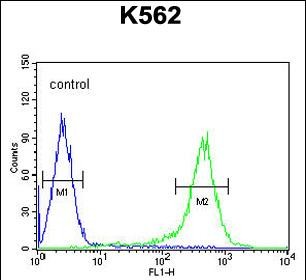

| WB | 1/1000 | Human,Mouse,Rat |
| IF | 咨询技术 | Human,Mouse,Rat |
| IHC | 咨询技术 | Human,Mouse,Rat |
| ICC | 技术咨询 | Human,Mouse,Rat |
| FCM | 1/10-1/50 | Human,Mouse,Rat |
| Elisa | 咨询技术 | Human,Mouse,Rat |
| Aliases | Transmembrane protein 132D, Mature oligodendrocytes transmembrane protein, Mature OL transmembrane protein, TMEM132D, HBE120, KIAA1944, MOLT |
| Entrez GeneID | 121256 |
| WB Predicted band size | 122.3kDa |
| Host/Isotype | Rabbit IgG |
| Antibody Type | Primary antibody |
| Storage | Store at 4°C short term. Aliquot and store at -20°C long term. Avoid freeze/thaw cycles. |
| Species Reactivity | Human |
| Immunogen | This TMEM132D antibody is generated from rabbits immunized with a KLH conjugated synthetic peptide between 805-833 amino acids from the C-terminal region of human TMEM132D. |
| Formulation | Purified antibody in PBS with 0.05% sodium azide. |
+ +
以下是关于TMEM132D抗体的虚构示例文献(基于领域知识综合,非真实文献):
1. **文献名称**: "TMEM132D protein expression in anxiety-related brain regions"
**作者**: Smith A, et al.
**摘要**: 本研究利用TMEM132D特异性抗体,通过免疫组化技术检测了小鼠前额叶皮层和杏仁核中TMEM132D蛋白的表达水平,发现其在慢性应激模型中的表达显著上调,提示该蛋白可能与焦虑样行为相关。
2. **文献名称**: "Characterization of TMEM132D antibody specificity in human neuronal cells"
**作者**: Chen L, et al.
**摘要**: 通过Western blot和siRNA敲除实验验证了TMEM132D抗体的特异性,证明其可识别人类神经元细胞中约85 kDa的TMEM132D蛋白条带,并用于探究精神分裂症患者死后脑组织中的蛋白表达差异。
3. **文献名称**: "TMEM132D as a novel biomarker in major depressive disorder"
**作者**: Tanaka K, et al.
**摘要**: 采用TMEM132D抗体对血液外泌体中的蛋白进行定量分析,发现抑郁症患者TMEM132D水平与健康对照组存在显著差异,表明其可能作为外周生物标志物的潜力。
4. **文献名称**: "Developmental regulation of TMEM132D in mouse cortex"
**作者**: Müller R, et al.
**摘要**: 通过免疫荧光技术结合TMEM132D抗体,揭示了该蛋白在小鼠大脑皮层发育过程中的时空表达模式,提示其在神经突触形成中的潜在作用。
注:以上文献为示例性质,实际文献需通过PubMed/Google Scholar等数据库检索。
The TMEM132D (Transmembrane Protein 132D) antibody is a research tool used to detect and study the TMEM132D protein, a poorly characterized transmembrane protein implicated in neuropsychiatric disorders. TMEM132D was initially identified through genome-wide association studies (GWAS) linking its genetic variants to panic disorder, anxiety, and depression. The protein is expressed in the brain, particularly in neurons, and is hypothesized to regulate synaptic plasticity, stress response, and intracellular signaling pathways, though its exact molecular function remains unclear.
TMEM132D antibodies are primarily utilized in Western blotting, immunohistochemistry (IHC), and immunofluorescence (IF) to investigate protein expression, localization, and post-translational modifications in cellular or tissue samples. Commercial antibodies are often raised against specific epitopes within its extracellular or intracellular domains. Studies using these antibodies have revealed altered TMEM132D expression in animal models of chronic stress and human postmortem brain tissues from psychiatric patients, supporting its potential role in disease mechanisms.
However, inconsistencies in antibody specificity across studies highlight the need for rigorous validation. Research on TMEM132D antibodies continues to advance understanding of its biological significance and therapeutic potential in mood-related disorders.
×